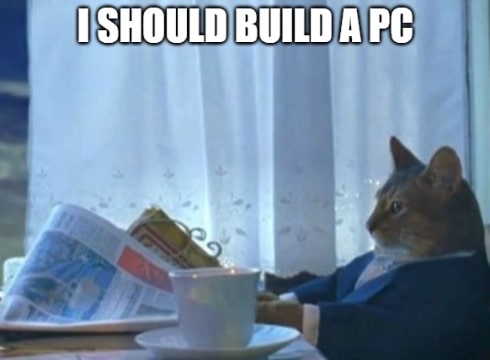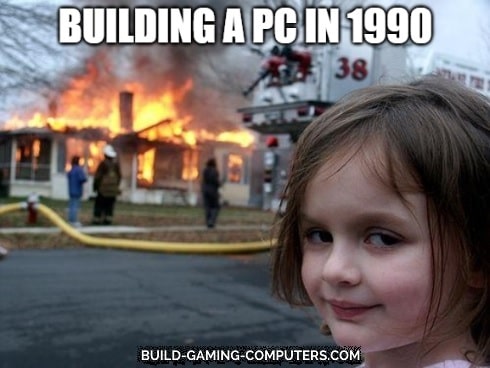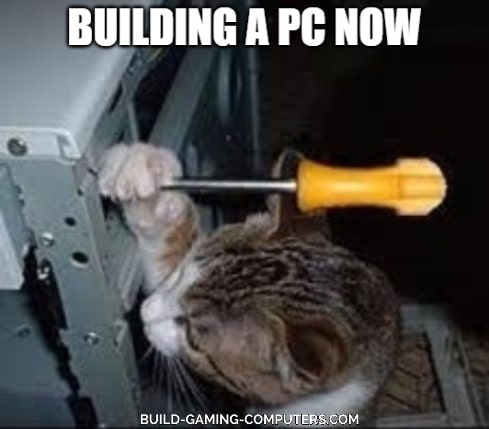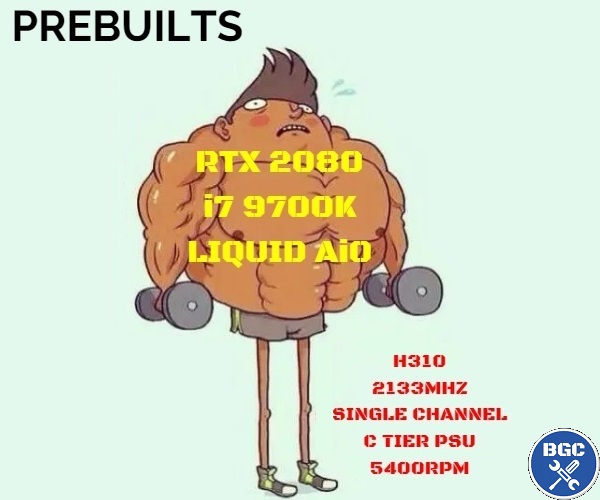Home > Gaming PC Builds > Why Build a PC
13 Reasons Why You Should Build a PC
Building a Computer vs Buying a Prebuilt Desktop (Explained for Beginners)
On the fence about whether to build a PC or buy one? These days it seems every gamer and his goat recommends building your own computer as the best way, and they compare succumbing to buying a prebuilt PC as a straight-up sin that will turn your gaming life upside down. But why? Why do I and many others suggest that you should build a computer? Are the benefits of building a PC really worth the extra time and effort? Is it actually easy to do like everyone says?
As biased as you may think I am (since I do run a site that covers, well, building PCs!), it's not my style to directly tell anyone what to do and how you should spend your money. I can only present my honest opinion, and therefore I always strive to be as balanced in my advice to you guys as I possibly can be.
So with that said, the truth is that buying a prebuilt gaming PC does have its place for some, and isn't the end of the world if you really want to get up and running with a new setup ASAP due to perhaps being really strapped for time (or if you're the impatient type and not afraid to admit it). Especially at a time like this when individual GPUs are currently difficult to find in stock or at a reasonable price.
However, while buying a prebuilt computer can be a worthy option right now if you do your research and choose one wisely (as well as understanding and accepting their limitations), when you objectively compare building a PC vs buying a PC side by side, building just cannot be matched overall (assuming you find a GPU at an okay price). Besides being able to boast about your feat to gaming buddies, on a practical level there are many advantages to building your own computer, some of which may surprise you.
So if you can muster up some courage to take the leap into the unknown, and sprinkle in a bit of patience (I think you're good on that front otherwise you wouldn't still be reading), and you're willing to learn an awesome new skill that will serve you well for the rest of your gaming days (and perhaps for work), the following are the exact reasons why you should build your next computer and leave that prebuilt on the shelf.
See Also: The Best Gaming PC Builds for the Money
 Smart kitty knows what's up
Smart kitty knows what's up1. It Really is Quite Easy (Even if Not Tech-Savvy)
Similar to how an aspiring Jedi Master must construct their own lightsaber in order to ascend in rank, you could say building a PC is the rite of passage for gamers wanting to take their experience, knowledge, and understanding to the next level. But the great thing is, these days building computers isn't hard, and isn't just reserved for computer science students, IT professionals, and hardcore tech enthusiasts (ones who perhaps throw in way too many Star Wars jokes at every possible opportunity).
Building PCs may have been a little trickier in the past, but nowadays it's a whole lot simpler and something that's accessible to gamers of any skill or knowledge level. The days of needing to be a tech whiz to build a computer were a long, long time ago in a decade far, far away (ok, I'll stop now). In fact, you've probably already heard the now overused, cliche saying that building a PC is essentially "Adult Lego". But is this an accurate comparison, or a bunch of baloney and people just over-exaggerating? Well, as Han Solo once said, it's true... all of it (I need help).


Building PCs has become more and more straightforward a process over the years, for various different reasons. For example, over time there's been a continued standardization of hardware components and connections (eg there's really only one way to fit and install something), manufacturers have continually strived to make components easier and easier to work with (eg good modern PC cases are a breeze to work with thanks to many user-friendly features), and the rise of quick and easy access to any sort of detailed information and resources online has also played its part.
These things mean that overall, the physical aspect of assembling your first computer is a piece of cake to get through if you simply find a well-written or well-presented guide from someone who has done this before, and then just take one step at a time. But it's not just the installation that's easy, as planning and picking the perfect parts for a new PC is also a whole lot easier these days thanks to people sharing their knowledge at scale all over the internet (and handy tools like PCPartPicker's compatibility checker).
2. Get the Fastest Performance for Your Money
End thread and case closed; this reason alone makes building a PC worth it for most people compared to buying a premade computer, especially for gaming and other demanding applications which need more powerful specs than the average PC user. If you play modern games, or even older ones which can still be demanding, you need fairly good hardware components to get a smooth experience (and even more so if you want to play on higher resolutions and on the best graphics quality settings.
That means you'll want to choose a good video card and ideally have the fastest one you can get your hands on within your new system for the best gaming performance possible, but that's where most prebuilt PCs fall short, as most will not come with the fastest graphics card for that system's particular price, and will often include a card that's a tier (or 2 or 3) below what you could get if you built your own PC instead. Many prebuilts, and even one's advertised as being for gaming, tend to be more CPU-heavy at the expense of the graphics. For example, they might have a fast i7 processor, but paired with a lesser graphics card that will limit the gaming performance of your system.
 Building a PC ensures you get the very best gaming experience possible
Building a PC ensures you get the very best gaming experience possibleTo get the best gaming performance for your money, the better way to go for most people would be to flip that script and get a more powerful graphics card with a more cost-effective CPU (a mid-range CPU is usually more than enough for gaming). Yes, having a good CPU is still important (for gaming but also for general system performance and longevity), but for gamers it's not as crucially important as the graphics card.
When you build a PC you have full control to choose the exact parts you want, including getting the fastest graphics card you can to fine-tune the balance of your system to skew towards maximum gaming performance (if that's your aim). But this benefit of building your own PC applies no matter what you're using your new system for. You have the freedom to tweak your component selections and build balance to maximize performance in whatever it is you plan to do whether that's video editing, 3D rendering, streaming, game development, CAD, emulation, music production, machine learning, or just casually taking over the world.
3. Get Higher Quality, More Reliable Parts
When you fork out all that money for a new computer, you want it to last as long as possible so the reliability and quality of your hardware components is arguably just as important as getting the fastest performing ones, and this is another key reason why building a PC is better than buying one.
You'll find many prebuilt desktops that on the surface appear to have it all, including a good CPU, decent gaming graphics card, and a seemingly respectable supporting cast of components. Everything seems great, and you'll ask yourself why should I build a PC when I can just buy this pre-assembled rig that seems totally legit?
But here's the thing...
If you do some research and look closer "under the hood" of most prebuilt PCs, you'll find that some (if not all) of the internal components are made up of cheaper, lower-quality models with average specs and features, from lesser-known, less reputable, cheaper brands and manufacturers. In other words, the overall specs of a system may sound just great to the untrained eye, but what's actually included in the system might not be all it's cracked up to be.
 Like many in the gym who avoid training legs, many prebuilts lack a strong base
Like many in the gym who avoid training legs, many prebuilts lack a strong baseThe far majority of companies that sell premade systems use cheaper parts in order to keep their outlay costs low and profits as high as they can be. This is good for them, but means less reliability, performance, cooling, and overall lastability for you. It's just the nature of how the computer business works, because if companies used the best quality parts in their systems, they likely wouldn't make much (if any) money as the margins would be too small.
This is why it's not uncommon to have to really do some digging around to find out which exact component model, specs, and brands are included inside a particular prebuilt, as the main product listings oftentimes only quickly gloss over the generic specs without going into much detail (done on purpose).
When you build your own computer, you can avoid average parts and choose to only include good (or great) components from the most reliable, trustworthy brands to end up with a well-balanced system that's quality throughout. You could say a PC is only as good as its weakest link; you can have the greatest "showy" parts in the world like a great CPU and GPU, but if your less flashy components (PSU, motherboard, etc) are a hazard then it all counts for nothing if they end up causing problems later on (or dying on you sooner than expected like Lord Stark).
4. Better Cooling for a Quieter, Longer-Lasting PC
Building on the previous benefit, when you build a PC and have full control over only including good parts, you can also plan for maximum airflow and cooling. Having proper airflow within your PC is crucial for high-performance usage like gaming, but many prebuilt computers fall short in this regard, making this one of the biggest advantages to building a computer. With average or straight-up bad ventilation and airflow, your computer can get real hot and real loud real fast.
When you build a PC you can make doubly sure your new setup will be well-cooled from the start by choosing a well-designed case that promotes natural airflow, including sufficient case fans for your particular hardware configuration, rocking a good CPU cooler for your needs, as well as making sure all excess cabling within your rig is kept to a minimum and out of the way as they can restrict airflow and promote dust build-up (some prebuilts actually come quite crammed inside; not good).
These things will ensure your new gaming computer runs as cool and quiet as possible, which will not only maximize the lifespan of your precious parts in the long term (save you more money over the long haul too!) but will also keeps your rig running as optimally fast as possible in the short term (if your system overheats due to poor airflow, it can even throttle down performance in order to cope).
5. Building a PC Can Save You Money
So, I've said that building computers means you get the best performance, the best quality, AND the best airflow/cooling. But at risk of sounding like a lame hype train, here's what's EVEN better about all of the above: if you choose and combine parts wisely by carefully pinpointing where the current best value PC parts are within the market, in many situations you can even get all these benefits AND save money in the process (compared to buying a PC). Though be aware that if graphics card prices are still higher than normal when you plan your build, that may eat away (or even eliminate) your savings, though keep in mind that when GPU prices are super high, prebuilt PCs tend to be more expensive too (so it may even itself out).
See Also: How to Save Money When Building a PC (Thrifty Tips)
6. Get the Exact Design and Features You Want
With a premade desktop you're limited with whatever designs you can find available, but with your own custom build you can tweak pretty much anything and everything until the ends of the Earth should you want to. Want a particular type of overall build theme or design? Or perhaps a certain matching color scheme such as an all-white ice killer, or a low-key stealth-style black and grey monster?
Maybe you want some cool standout LED or RGB lighting? Whatever you want, it's all possible with a custom PC, and these days it's quite easy to build a specific looking type of setup should you be after something more unique-looking by simply using a similar parts-list that someone else used to achieve that desired theme you're after.
But it's not just about looks, and when you choose your own parts you have the freedom to include whichever exact practical features that you want, such as particular ports, connections, expansion slots, drive bays, and so on. With a prebuilt, you're stuck with whatever you get and have to rely on add-on adapters and stuff like that if you want to add a certain feature (if it's even compatible with your particular prebuilt in the first place).
7. Upgrades and Maintenance Becomes Easy
When it comes time to upgrade your gaming PC a few months or years down the track, after having built a PC it'll be an absolute breeze to do as you'll not only have the confidence to handle and install components, but you'll also be very familiar with the layout and capabilities of your system (and what sort of upgrades are compatible and optimal for your particular rig in the first place).
Plus, some prebuilts aren't just limited in the upgrades you can do to them, but opening up the case and fiddling around inside of one too much (let alone actually physically upgrading something) might even void your warranty in some instances. Truth is, some prebuilts are fine to do various upgrades to, but again, if you didn't build your PC then you're missing out on a ton of handy knowledge that'll set you up for a much more fruitful life as a gamer, streamer, video editor, or whatever it is that you do with your rig.
8. No More Pre-Installed "Bloatware"
Bloatware is the typically accurate term given to the unnecessary software and trial programs that most big brand prebuilt desktops pack onto their systems, which can be annoying and time-consuming to navigate and uninstall when first setting up a new prebuilt PC (especially if you're not that tech-savvy; knowing which programs you need and which are a waste of resources can be tricky). All this pre-loaded software can even slow down your system from the get-go. The extent of pre-installed software varies depending on the manufacturer, but most prebuilt PCs have some form of it.
When you build a PC yourself, you get your new setup off to a completely fresh, clean start without anything installed that you don't want or need. That makes for an optimal-performing PC out the gate, and you can then carefully pick and choose exactly what you want to install.
See Also: Good Software to Install on a New PC
9. Better, Longer Warranties
Yes, it's true - when you buy PC components separately, you'll generally get a better warranty compared to a prebuilt. For example, CyberPowerPC systems (a popular prebuilt brand) come with a 1 year warranty, but when you buy good quality parts yourself you'll typically get at least 2 years, and longer for top of the range parts (5+ years isn't uncommon).
To add to that, when a component of a prebuilt PC breaks or become faulty, you'll probably have to send the whole computer back to the manufacturer to be repaired, which is a pain in the lower rear regions as you might imagine and means you'll be without a PC for a while. Compare this to building a PC, where if a part is faulty you can simply send that little sucker back and you still have your entire system to work with.
10. You Learn a Very Practical, Invaluable Lifelong Skill
This is an often overlooked aspect of building your own custom computer. By going the DIY route you will learn a lot about computers, including hardware, upgrading, troubleshooting, fixing computer problems etc. These skills are definitely handy and especially useful if you study or work/plan to work with computers in the future.
On top of all that, building a PC is a fun experience. Not just the physical building part, but getting to design your killer system from scratch and choosing out all of your awesome components and features. Once you have finished your build you will forever have a sense of pride and accomplishment every time you boot up, knowing that you made it all happen and that it's your very own unique machine.
11. Never Need to Call Tech Support Again
Learning to build a computer means a little upfront effort to understand all the basics, but it will pay off for you over time. You'll become more and more self-sufficient with each build and upgrade you do, as you'll become knowledgeable enough with computers (and specifically knowledgeable with your particular setup and its exact layout, features etc) to be able to pinpoint problems quickly and easily find solutions.
When you buy a prebuilt desktop, if something isn't performing optimally or something breaks, you'll have to call up and rely on the manufacturer to get help (especially if you never learned the basics of how a PC works, something you naturally pick up when building your first PC). Calling tech support usually isn't a problem, but it can be a hassle, and might include waiting on hold for a long time and/or receiving a subpar standard of service depending on the particular company (or if I'm being honest, depending on the current mood of the particular guy or gal you end up getting on the line).

A long time ago back when I was really just starting up this site and other online projects on the side, one of the various random jobs I had was at a a telecommunications company (and funnily enough, another of the random jobs I worked around that same time in my life was indeed selling prebuilts). I saw behind the scenes of a typical tech support operation, as I was in the sales team next door and could hear almost all their conversations. Let's just say it was a rarity to hear someone on that team who actually cared about helping the customer understand and fix their issues properly and in as timely a manner as possible. If someone didn't know how to help the customer, route A was waste time until said customer gives up and calls it a day at best, and find a way to hang up on the customer at worst.
Of course this doesn't represent the entire galaxy of tech support peeps out there, and I'm sure there are plenty of respectable ones out there somewhere, but with something as awesome and precious as your gaming PC, I don't know about you but I'd hate to have to rely on the lottery that is calling tech support to fix my problems. Yes, this means when you build your own PC the responsibility is on you to find and fix any issues (well, unless a component is faulty which you can just send back for a replacement), but this is a good thing in my eyes as the solution to pretty much any problem is only a quick Google search away in this great digital age that we live in (and there are great communities out there like Reddit's buildaPC and techsupport.
12. Choose Your Own Operating System
Buying a premade computer means you have to use whichever operating system software is pre-installed on there. Usually that will be Windows 10 which is absolutely fine as it's by far the most popular and well-supported platform for gaming, but for those who perhaps want to use some sort of Linux setup (there are many variations such as Ubuntu) or if you want to use a specific version of Windows (or perhaps reuse your current copy of Windows) then this could be a worthwhile benefit to building your next PC.
13. Building a PC is Way More Satisfying
Besides all the technical reasons why building a PC is better than buying one, building your own gaming PC is simply fun! Your first custom build is often a fun, memorable experience, and you'll feel a sense of pride and satisfaction not only when you first boot up your PC successfully, but also every time you boot it back up knowing that you made it all happen and created it.
Sure; you didn't literally engineer the hardware components yourself like a freakin' genius in a lab, but you sure did put a whole lot more effort in compared to buying a prebuilt PC, and it's a rewarding feeling. Also, as someone who has built dozens and dozens of computers now (I used to build PCs for people as a side hustle), I can confirm that the feeling of satisfaction remains with every PC you build. At least that's true for me.
Still On the Fence?
When you look at all the advantages of building a computer, objectively speaking it really is worth the extra time and effort if you're not in a crazy hurry to get a new setup up and running in the next 12 seconds. If you've read this far and made it through the 424 bad jokes, there's no doubt you possess much more Jedi patience than is required to build a PC.
So, why not take the leap into the slight unknown? You have everything to gain. But if you're still a little intimidated by building a computer no matter how many times you hear that it's easy (I totally understand), if you actually DID decide to give it a shot anyway (despite being scared) then chances are once you've got through it you'll look back and think to yourself why you didn't build a PC sooner, as you realize for yourself that there really isn't anything to be worried about.
I mean, DIY computers can definitely get complicated if you dive in the deep end with advanced topics like custom water cooling loops and overclocking (though to be fair, even overclocking is safe and easy these days). But if you're like most people who only need to understand the basics, and who only require a regular gaming or work PC without any crazy advanced features, it really is quite hard to mess something up. But don't my word for it - enter the worst joke uttered on the site yet with our buddy old pal Sheev Shia Palpatine. If he doesn't get you motivated, nothing will.
 Best said out loud at 100+ decibels
Best said out loud at 100+ decibelsValue CPUs of the Month (Feb 2025)
- Intel Core i5 12400F (6 Core)
- AMD Ryzen 5 7600X (6 Core)
- AMD Ryzen 7 7800X3D (8 Core)
Trusted VPN
VPN software can be important in this day and age, especially if you do lots of online banking and/or use public WiFi whilst travelling. Having a VPN adds an extra layer of security to your PC or laptop to help protect your details such as financials, banking activity, etc. There are also benefits to using VPNs for gaming.
Because they're so popular these days, there are countless VPN providers, and it can be confusing to pick one. If you want my 2 cents, after a lot of research I decided on NordVPN 'cause it's one of the fastest, most reliable VPNs for both gaming and general use, with a lot of credible reviews out there backing that up. They also quite often run very solid deals.
Popular Articles
Value GPUs of the Month (Feb 2025)
- Gigabyte Radeon RX 7600 XT Gaming OC (16GB)
- Gigabyte Radeon RX 7800 XT Gaming OC (16GB)
- ASUS GeForce RTX 3060 Dual V2 OC (12GB)
Search the Site
About Me (2025 Update)
I'm an indie game developer currently developing my first public release, an immersive VR spy shooter with sci-fi themes set to release on Steam, partly inspired by the likes of Perfect Dark, MGS2, HL2, Splinter Cell, and Deus Ex. Researching, writing, and updating this site helps a little with self-funding the game, as I earn a few dollars here and there from Amazon's affiliate program (if you click an Amazon link on this site and buy something, I get a tiny cut of the total sale, at no extra cost to you).
I hope the site helps save you money or frustration when building a new PC, and makes your PC building journey easier and more fun. If you want to support the countless hours that's gone into creating and maintaining the site, besides using my Amazon links if purchasing something, sharing an article on socials or Reddit does help out and is much appreciated. I also accept coffee.

